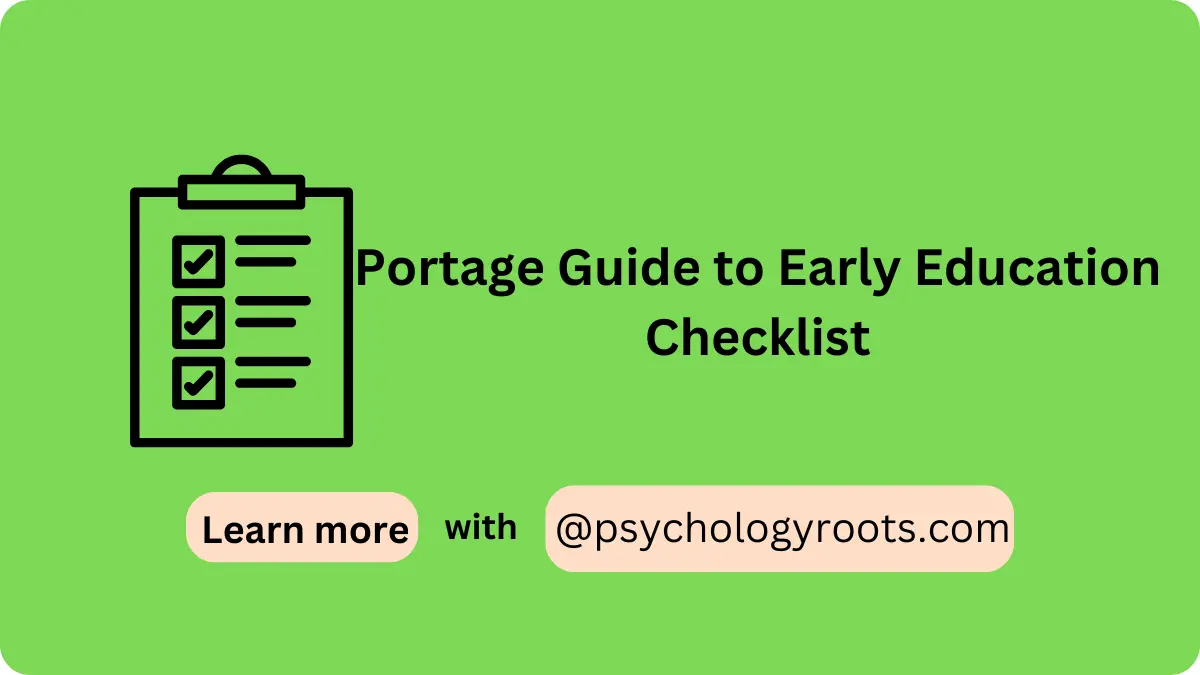Table of Contents
Portage Guide to Early Education Checklist
Here in this post, we are sharing the “Portage Guide to Early Education Checklist”. You can read psychometric and Author information. We have thousands of Scales and questionnaires in our collection (See Scales and Questionnaires). You can demand us any scale and questionnaires related to psychology through our community, and we will provide you with a short time. Keep visiting Psychology Roots.
About Portage Guide to Early Education Checklist
Scale Name
Portage Guide to Early Education Checklist
Author Details
Portage Project, Wisconsin, USA
Susan M. Bluma
Translation Availability
English

Background/Description
The Portage Guide to Early Education is a comprehensive developmental tool designed to support early childhood education and intervention, particularly for children with developmental delays or disabilities. Developed by the Portage Project in Wisconsin, USA, this guide provides a structured framework for assessing and enhancing the developmental skills of children from birth to six years old. The guide covers five key developmental domains: cognitive, language, motor, social-emotional, and self-help skills.
Originally created in the 1960s, the Portage Guide emphasizes individualized, family-centered approaches, ensuring that educational strategies are tailored to each child’s unique needs. It includes detailed checklists, activity suggestions, and progress-tracking mechanisms to assist educators, therapists, and parents in fostering the child’s growth. The guide has been widely adopted internationally due to its effectiveness in early intervention programs and its adaptability to various cultural contexts.
Administration, Scoring and Interpretation
- Obtain a copy of the Portage Guide to Early Education from authorized distributors or the official Portage Project website.
- Explain the purpose: The guide is used for assessing and developing a child’s skills across different domains.
- Provide instructions to parents, educators, or therapists on how to use the developmental checklists and activities.
- The assessment and activities can vary in duration but generally require ongoing, regular sessions over weeks or months.
- Administer the guide in a home or educational setting, ensuring consistency and involving parents or caregivers in the process.
Reliability and Validity
The Portage Guide to Early Education has demonstrated strong reliability and validity across various early intervention programs. Its structured assessment checklists provide consistent results, and numerous studies have validated its effectiveness in promoting developmental gains in young children, particularly those with special needs. The guide’s focus on family involvement and individualized instruction contributes to its success and high inter-rater reliability when used by trained professionals.
Available Versions
Multiple-Items
Reference
Portage Project. (n.d.). Portage Guide to Early Education. Wisconsin: Portage Project.
Bluma, S. M., & Shearer, M. S. (1976). Portage guide to early education. Portage Project.
Important Link
Scale File:
Frequently Asked Questions
What is the Portage Guide to Early Education?
It’s a developmental tool for assessing and enhancing skills in children from birth to six years old, especially those with developmental delays.
Who can use this guide?
Educators, therapists, and parents involved in early childhood intervention programs.
What developmental areas does it cover?
It covers cognitive, language, motor, social-emotional, and self-help skills.
Is it suitable for children without developmental delays?
Yes, it can be used for all children to track and support early development.
How long does the assessment process take?
The process is ongoing and tailored to the child’s progress, typically over several weeks or months.
Disclaimer
Please note that Psychology Roots does not have the right to grant permission for the use of any psychological scales or assessments listed on its website. To use any scale or assessment, you must obtain permission directly from the author or translator of the tool. Psychology Roots provides information about various tools and their administration procedures, but it is your responsibility to obtain proper permissions before using any scale or assessment. If you need further information about an author’s contact details, please submit a query to the Psychology Roots team.
Help Us Improve This Article
Have you discovered an inaccuracy? We put out great effort to give accurate and scientifically trustworthy information to our readers. Please notify us if you discover any typographical or grammatical errors.
Make a comment. We acknowledge and appreciate your efforts.
Share With Us
If you have any scale or any material related to psychology kindly share it with us at psychologyroots@gmail.com. We help others on behalf of you.